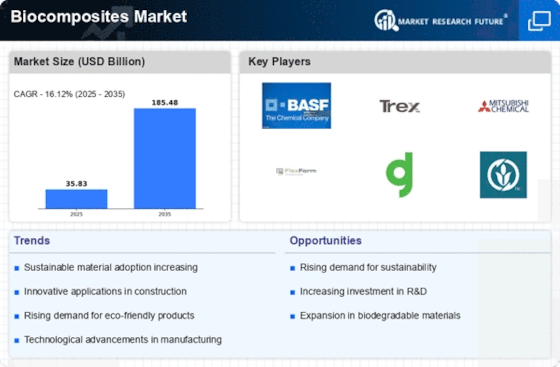Top Industry Leaders in the Biocomposite Market

Biocomposites, a blend of natural fibers and bio-based resin, are emerging as a sustainable alternative to traditional composites made from petroleum-derived materials. Their remarkable properties, including low weight, high strength, and biodegradability, are fueling their adoption across diverse industries like automotive, construction, and consumer goods. However, navigating this competitive landscape demands strategic foresight and adaptability.
Key Strategies Driving Market Growth:
-
Product Diversification: Leading players like UPM, Trex Company, and Fiberon are continuously expanding their biocomposite portfolios, introducing novel formulations tailored to specific end-use requirements. This differentiation caters to niche markets and strengthens customer loyalty. -
Vertical Integration: Securing upstream control over key raw materials like natural fibers is crucial for ensuring stable supply chains and cost competitiveness. Companies like Green Composites are actively pursuing vertical integration, gaining control over critical resources. -
Technological Advancements: Continuous research and development in novel bio-based resins, improved fiber processing techniques, and biocomposite manufacturing efficiencies are vital for sustained growth. Tecnaro's recent breakthrough in using recycled plastic waste in bio-resin production exemplifies this innovative approach. -
Geographic Expansion: Emerging economies like China and India present immense potential for biocomposites. Companies like JELU-WERK J. Ehrler GmbH & Co. KG are strategically building production facilities in these regions to capitalize on the growing demand. -
Sustainability Focus: Environmental concerns surrounding traditional composites are pushing manufacturers towards greener alternatives. Newtechwood's focus on using post-consumer recycled wood fibers in their biocomposite decking demonstrates this commitment to sustainability.
Factors Dictating Market Share:
-
Brand Reputation and Reliability: Established players with proven track records like Universal Forest Products, Inc. and Meshlin Composites ZRT enjoy significant market share due to their brand recognition and consistent quality. However, innovative startups addressing specific applications can still carve out their space. -
Cost Competitiveness: Optimizing production processes and sourcing affordable natural fibers and bio-resins are crucial for cost leadership. Asian manufacturers often have an edge due to lower labor costs, but premium brands command higher prices due to superior performance and environmental credentials. -
Distribution Network and Customer Service: Extensive distribution networks and prompt technical support are essential for customer satisfaction and repeat business. Companies like FlexForm Technologies excel in this area. -
Regulatory Landscape: Stringent environmental regulations, especially in Europe and North America, are pushing manufacturers towards bio-based materials and sustainable production practices. Adapting to evolving regulations and developing compliant products becomes crucial for market success.
Key Players:
- MCG Biocomposites LLC (U.S.)
- Anhui Guofeng Wood-Plastic Composite Co. Ltd. (China)
- COMPOSITES PVT.LTD. (India)
- Green Dot Holding LLC (US.)
- Yixing Hualong New Material Lumber Co. Ltd. (China)
- Advanced Environmental Recycling Technologies Inc.(US.)
- Bcomp Ltd.(Switzerland)
- Nanjing Xuha Sundi New Building Materials Ltd. (China)
- Lingrove LLC (US), among others
Industry News and Recent Developments:
August 2023: Ford Motor Company announces plans to use biocomposites in the interior trim panels of its new electric vehicle model, highlighting the material's growing prominence in the automotive sector.
September 2023: The European Union unveils a new Green Deal initiative aimed at promoting the use of bio-based materials in construction projects, boosting demand for biocomposites in this industry.
November 2023: The US Department of Agriculture announces a grant program to support research and development of new bio-based resins and fiber processing technologies, fueling further innovation in the sector.
December 2023: A consortium of leading biocomposite manufacturers and research institutions launches a collaborative project to develop standards for biodegradability and lifecycle assessment of biocomposites, addressing concerns about end-of-life management.










